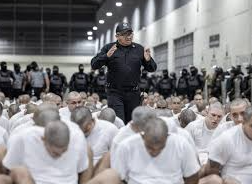
Controversy Erupts as US Deports Hundreds to El Salvador Despite Court Order
The White House has denied allegations from human rights groups that it bypassed legal procedures by disregarding a judge’s order while executing deportations over the weekend.
A total of 261 individuals, including 238 suspected Venezuelan gang members and 23 alleged affiliates of MS-13, were deported from the US to a high-security prison in El Salvador. Some were expelled under a law that had not been invoked since World War Two.
Despite a judge issuing a temporary halt, the White House argued that the ruling had no legal standing and was announced only after the deportations had already taken place. Neither the US nor El Salvador has released information on the identities of those deported or provided evidence of their alleged gang affiliations.
Announcing the action on Saturday, President Trump accused the Venezuelan group Tren de Aragua (TdA) of launching an “attempted invasion” of the US. To justify the move, he invoked the Alien Enemies Act, a rarely used law dating back to 1798, designed to expel non-citizens during times of war or invasion. Critics have challenged Trump’s rationale for using this legislation.
A senior administration official confirmed that 137 of the deportees were removed under the Alien Enemies Act but did not clarify the legal grounds for the remaining cases. Several family members of those deported told The New York Times that their relatives had no gang ties.
US District Judge James Boasberg issued a ruling on Saturday evening ordering a 14-day suspension of the deportations. However, by the time the order was given, planes carrying deportees had already taken off. Reports indicate that the judge verbally instructed flights to return, but this directive was not included in his written ruling.
White House press secretary Karoline Leavitt insisted that the administration had not violated the court order. “The government did not defy any legal ruling,” she stated. “The directive had no legal basis and was issued after TdA terrorists had already left US territory.” The Department of Justice echoed her stance, confirming that the deportees had departed before the judge’s ruling and that the government had appealed the decision.
The case raises concerns about constitutional checks and balances, as federal agencies are expected to comply with judicial rulings. Amnesty International and the American Civil Liberties Union (ACLU) have strongly criticised the administration’s actions. ACLU attorney Lee Gelernt warned that invoking an outdated wartime law to accelerate deportations sets a dangerous precedent. “This law applies in cases of war or invasion—gang activity does not qualify,” he told BBC News.
Salvadoran President Nayib Bukele confirmed the deportees’ arrival, posting footage of them inside a mega-prison and dismissing the US judge’s order with a mocking remark on social media: “Oopsie… Too late.”
Meanwhile, Venezuela condemned Trump’s actions, accusing him of unjustly criminalising its migrants. Human rights groups have also accused the US president of targeting Venezuelans based on broad, unverified claims of gang membership.
These deportations are the latest in Trump’s ongoing crackdown on illegal immigration. His administration has also sought to strengthen ties with El Salvador, where the gangs targeted in this operation were recently designated as foreign terrorist organisations.









